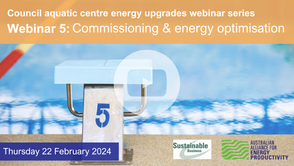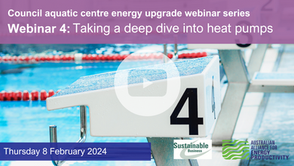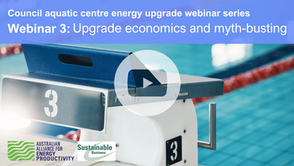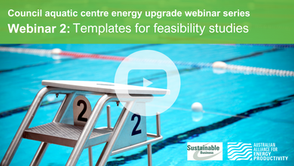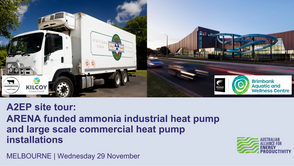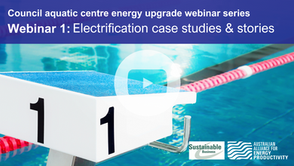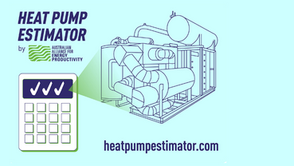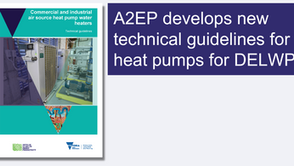
Aquatic centres are often the highest energy-consuming assets for local councils. Vast amounts of energy are required to power a number of devices and provide a number of services:
-
Heating water for the pool and for showers
-
Heating and cooling the indoor areas to maintain a comfortable temperature
-
Powering pool filtration pumps
-
Lighting for indoor and outdoor areas
-
Electrical appliances and equipment.

ENERGY USE IN AQUATIC CENTRES
Research and energy audits reveal a number of challenges that push up energy use which facility managers would be all too aware of:
-
Enormous amounts of hot humid air leaving the building and being replaced by outdoor air that must be heated or cooled
-
Solar gain through the building fabric in hot weather
-
Heat from the active people using the facility
-
The accumulation of hot humid air and resulting condensation.
Breaking news! Congratulations to the 58 councils awarded a total of $50 million in grants through the Community Energy Upgrades Fund
Congratulations to all the 58 Australian councils successful in their grant applications through the Australian Government's Community Energy Upgrades Fund. We were thrilled to see 20 of the successful projects are for aquatic centre electrification and energy upgrade projects, a total of more than $27 million in grants. Aquatic centres are often the highest energy-consuming assets for local councils, making them a major source of emissions and expense. After proposing support for aquatic centre electrification and upgrades to then-Assistant Minister, Jenny McAllister, in January 2023, we welcomed the launch of the Community Energy Upgrades Fund in December 2023.
.png)
A2EP was then engaged by the Australian Department of Climate Change, Energy, the Environment and Water to deliver a capacity building program for local government, which consisted of technical webinars and network meetings, which we delivered in early 2023 and proved very popular and useful for councils planning grant submissions and projects. We look forward to seeing these projects roll out and sharing the results and learnings.
See the full list of grant recipients on the DCCEEW website.
Applications for Round 2 of the Community Energy Upgrades Fund are now open
Local governments and joint local government bodies can apply for grants of between $25,000 and $2.5 million for energy efficiency and electrification upgrades of local government facilities. With up to $50 million available - grants will provide matched funding for projects such as:
-
replacing high energy use heating in council pools with energy saving heat pumps
-
installing energy efficient lighting at sporting fields, libraries and community centres
-
investing in other energy efficiency and electrification upgrades.
The CEUF is a merit-based, competitive grants program. Applicants that were unsuccessful in Round 1 are encouraged to re-apply. Please read the Guidelines carefully as they have been updated for Round 2. Applications will open 4 March 2025 and close 13 June 2025. Click here for grant guidelines and to submit applications.
_edited.jpg)
In anticipation of the launch of the Australian Government’s $100 million Community Energy Upgrades Fund grant program, A2EP (together with Sustainable Business consultancy) has developed a series of webinars to build awareness, skills and knowledge of council staff to scope and support successful energy upgrades in local government aquatic centres. The webinars will also be relevant to councillors, consultants, equipment providers, installers and others that help make aquatic centre energy upgrades happen.
The webinars were developed following a workshop convened by A2EP in October 2023 to better understand council systems, processes and understanding for securing an economical, reliable, efficient energy upgrade for their aquatic centre.

Webinar 1: Case studies and stories – electrification projects you can learn from
Thursday 23 November 2023
Webinar 2: Templates for feasibility studies – setting your project up for success
Thursday 30 November 2023
Webinar 3: Upgrade economics and myth-busting - making your business case
Thursday 7 December 2023
Webinar 5: Commissioning and energy optimisation
Thursday 22 February 2024
Online council network meetings to support aquatic centre energy upgrades
We will be hosting five online network meetings for council officers looking to implement aquatic centre energy upgrades, particularly those looking to submit applications for the Community Energy Upgrade Fund. In these meetings, council representatives will be invited to submit questions to our experts and each other to enable capacity building and knowledge sharing. These meetings will take place via Zoom on the following dates and are open to all council officers:
-
Thursday 18 January: energy mapping - watch the recording
-
Thursday 1 February: roadmaps for electrification - watch the recording
-
Thursday 15 February: refrigerant choices - watch the recording
-
Thursday 29 February: heat pump cost estimates - watch the recording
-
Thursday 14 March: procurement assessment matrix - watch the recording
MORE RESOURCES FOR THE ELECTRIFICATION AND DECARBONISATION OF AQUATIC CENTRES
A2EP has developed a range of resources and tools to supporting councils, schools and hotels seeking to install heat pumps and/or improve overall energy performance of aquatic centres and large pools:
-
Technical Guidelines for Commercial and Industrial Air Source Heat Pump Water Heaters
- with a special section on aquatic centre applications - developed by A2EP for the Victorian Government -
A2EP's Heat Pump Estimator
- for initial sizing and costing of heat pumps for commercial and industrial applications -
Refrigerant Guide for Heat Pumps
- developed with support from RACE for 2030 -
Guide: Measurement and Verification of Heat Pump Projects for Certificate Creation
- developed by Northmore Gordon for RACE for 2030 -
Assessing heat pump readiness: a guide for commercial and industrial sectors
- developed by Bridgeford Group for RACE for 2030
Case studies:
-
Kardinia Aquatic Centre - Geelong, Victoria
-
Doone Kennedy Hobart Aquatic Centre - Hobart, Tasmania
-
Cabarita Swimming Centre - Cabarita, New South Wales
Resources from other organisations:
-
Energy efficient water heating technology guide for aquatic centres - NSW Department of Planning, Industry & Environment
-
Energy and water metering and monitoring guide for aquatic centres - NSW Department of Planning, Industry & Environment
-
Brimbank Aquatic and Wellness Centre case study - Australian Renewable Energy Agency
-
Renewable energy options for industrial process heat - Australian Renewable Energy Agency
-
The all-electric Northcote Aquatic and Recreation Centre - Green Building Council of Australia
Energy upgrade and certificate schemes:
-
NSW Energy Savings Scheme - NSW Department of Planning, Industry & Environment
-
Victorian Energy Upgrades Program - Vic Department of Energy, Land, Water and Planning

.png)

.png)
.png)
.png)
